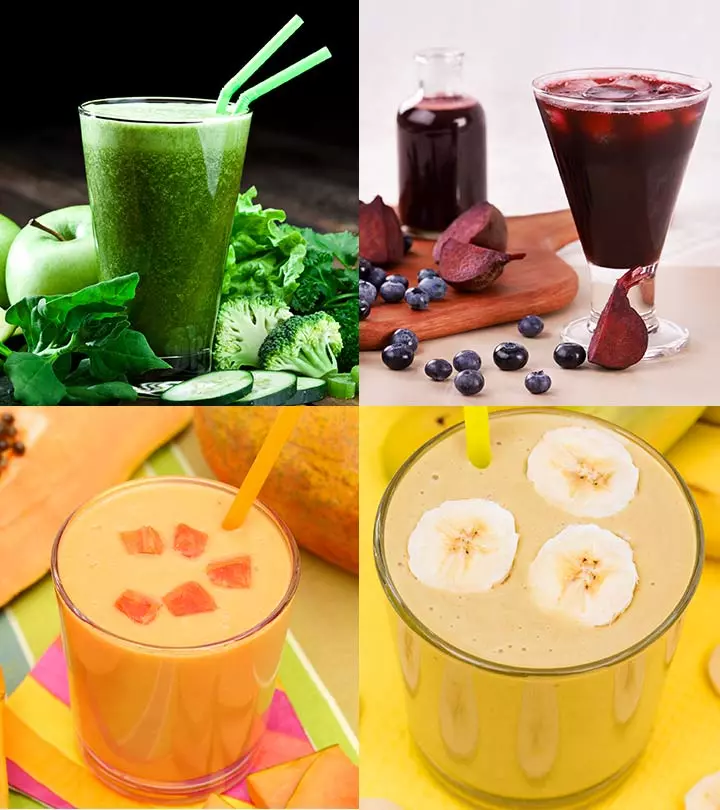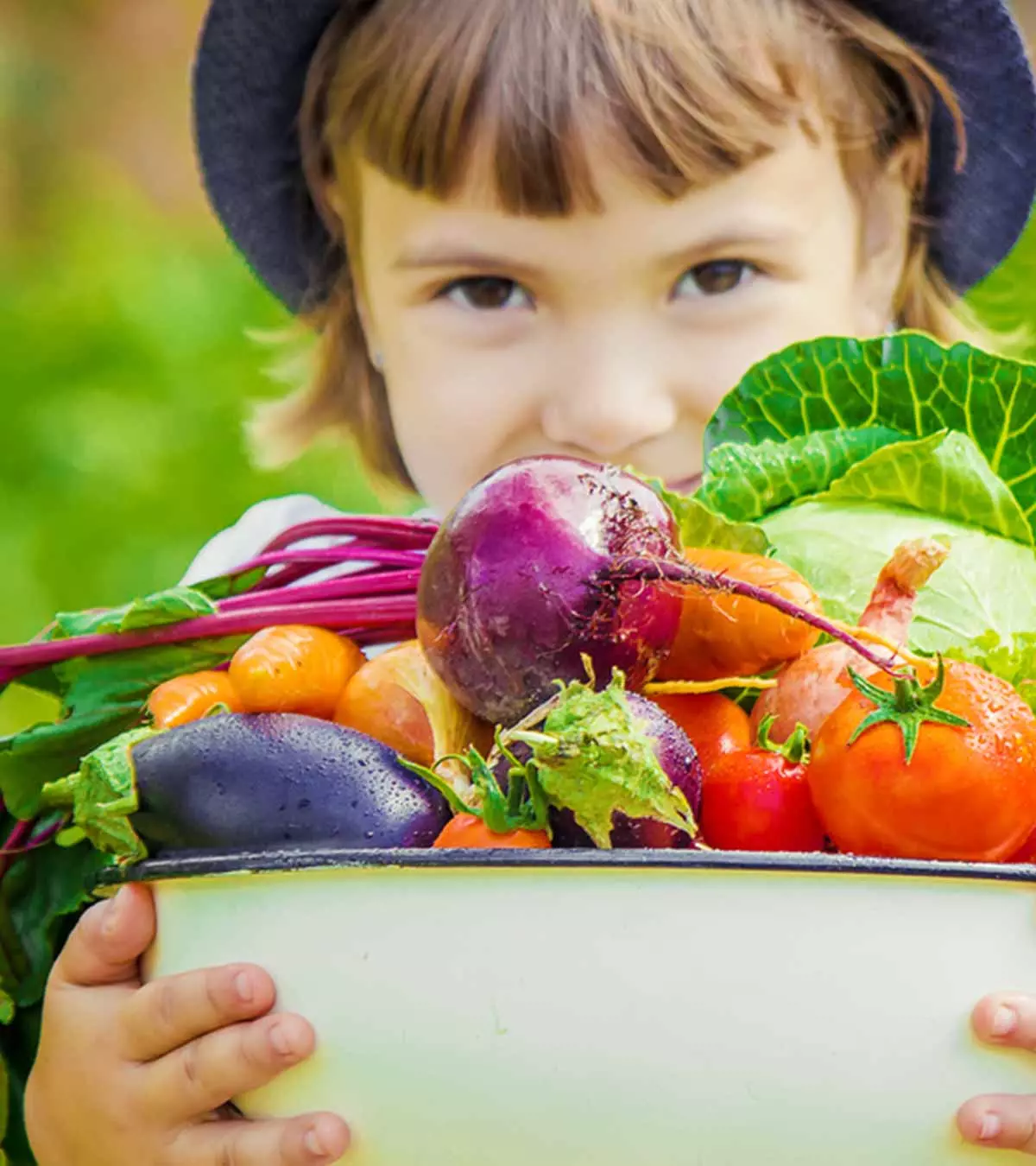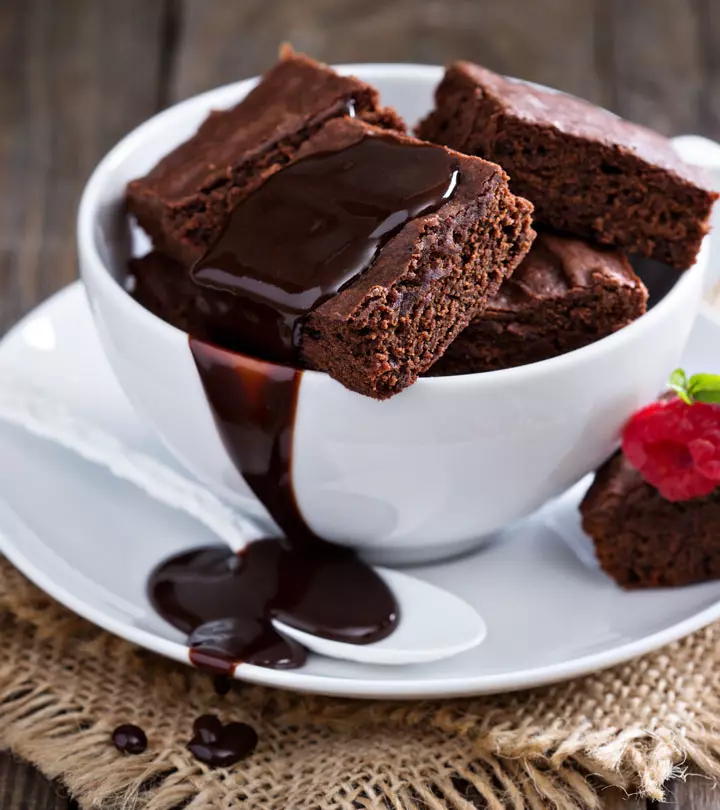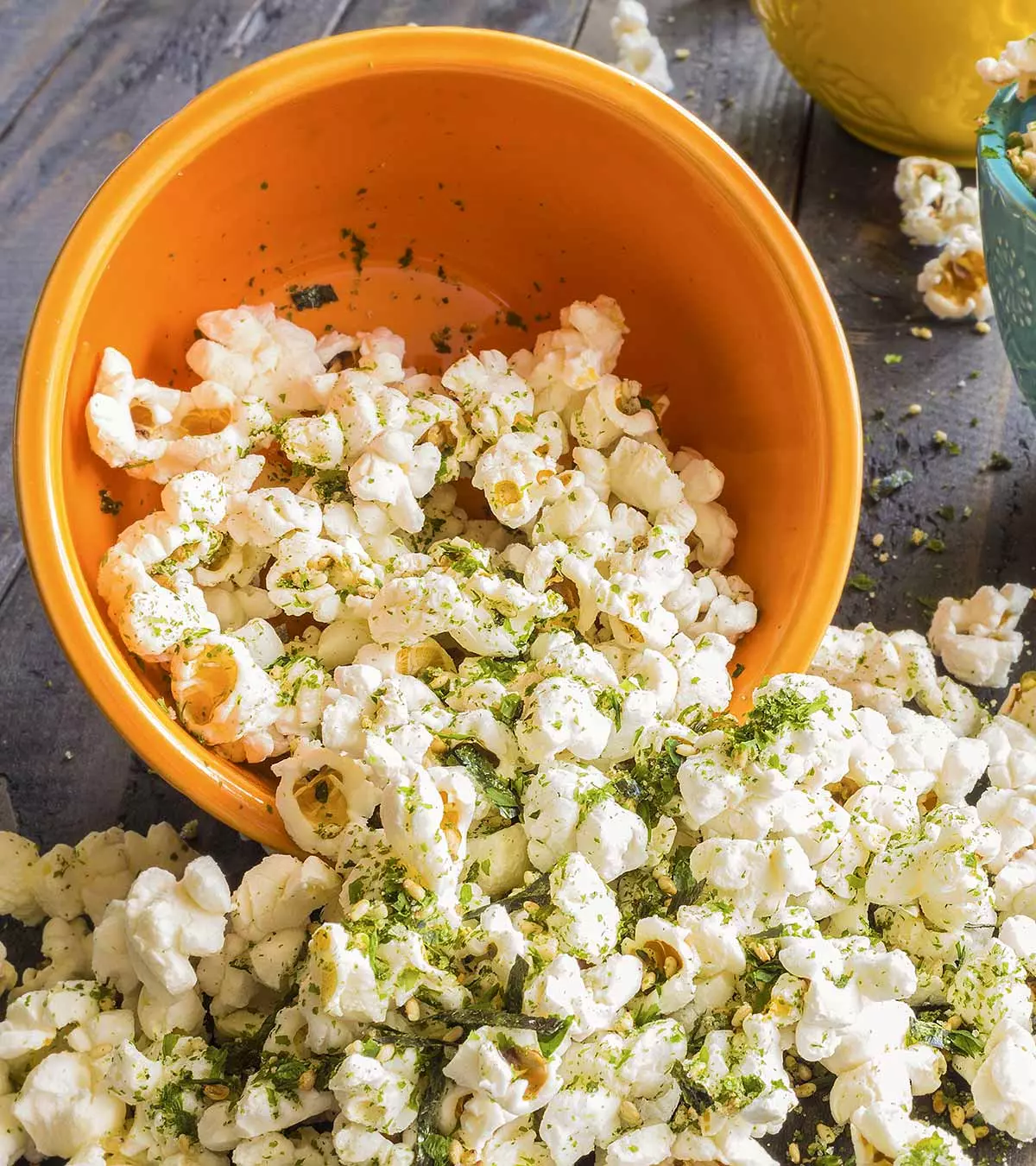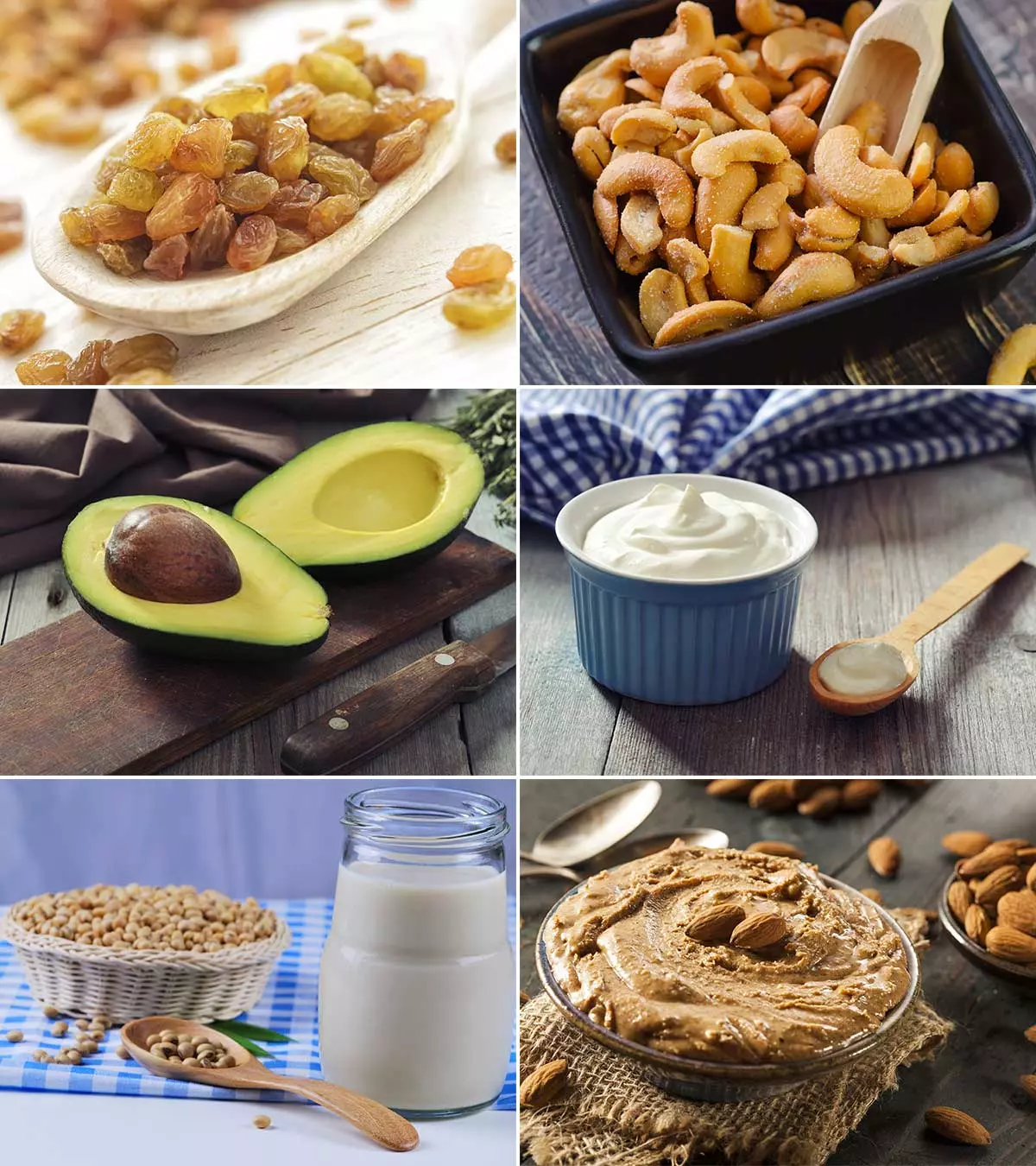
Image: iStock
Baking muffins for babies is a great way to include fruits and veggies in their diet in an enjoyable manner. Their soft, spongy texture makes them easy for babies to consume.
Muffins are soft baked goods made with a batter mainly containing flour, egg, milk, and butter. They can be customized as per preference to make sweet or savory ones and contain dry fruits, seeds, and nuts.
However, you may wonder at what age infants can be introduced to these nutritious treats. Also, the possibility they contain allergens, such as eggs or milk, could be worrisome. Read this article to learn some healthy muffin recipes fit for babies, the right age to consume muffins, and how to customize muffin recipes in an age-appropriate manner.
Key Pointers
- You may introduce small servings of muffins to your baby between the ages of six and nine months.
- Prepare muffins with healthy ingredients such as fresh or dried fruits, oats, veggies, and millets after consulting your child’s pediatrician.
- Tasty and easy muffin recipes for babies include those containing applesauce, oats, carrots, and sweet potatoes.
Right Age To Feed Muffins To Babies
Babies can begin eating tiny pieces of muffins anytime between six and nine months of age (1). However, each baby is different and you should look for the signs of developmental readiness. Generally, most babies will be ready to eat muffins by 10 to 12 months of age.
Muffins are multi-ingredient foods made with common allergens, such as milk, egg, and nuts. So, before you introduce muffins to your baby, consult your pediatrician. However, this doesn’t mean you need to delay feeding muffins to your babies.
According to the American Academy of Pediatrics (AAP), parents can introduce potential allergens early in life to prevent allergies (2). Once you have the doctor’s permission, try age-appropriate muffin recipes for your little one. You can prepare healthy yet delicious baby-friendly muffins using some tips shared in the next section.
 Point to consider
Point to considerTips To Make Muffins Healthier
Muffins are popular breakfast foods for babies, but they contain certain ingredients, such as salt and high sugar, which aren’t healthy for babies and even adults. However, you can make healthy homemade muffins by following some simple tips.
- You may mix different flours, including the traditional all-purpose flour, whole-wheat, oats, quinoa, or millet. Experiment a few times with these and several other healthy ingredients to get the perfect blend for a customized muffin recipe.
- Add fresh fruit, such as blueberries, mango, apple, and banana, in the form of mash, puree, or pieces. Fruits add color and sweetness to the preparation. You can also use dried fruits, such as figs and dates, to make the muffins naturally sweet and healthy. But make sure these are well-chopped for babies.
- Add different veggies in puree, mash, grated, or chopped forms to create savory muffins. Avocado, broccoli, butternut squash, zucchini, carrot, and spinach are some good choices. You can add two or more veggies to make the recipe versatile.
- Include nuts and seeds powder for younger babies, whereas for older babies and toddlers, use finely chopped or coarsely powdered nuts and seeds. Adding nuts and seeds, such as walnut, almond, and sesame seeds, provides your baby and toddler with several vital nutrients, such as calcium and omega-3.
- Replace white or brown sugar with fruits and dried fruits, such as prunes and raisins, to sweeten a muffin. Honey, maple syrup, and molasses are other options for babies older than 12 months.
Katie Hlucny, a registered dietitian nutritionist from Grand Forks, North Dakota, says, “Waiting to serve your baby foods with added sugar will help prevent obesity, type 2 diabetes, and cavities. It will also help your baby not to prefer sweet foods in the future. Use dates, bananas, applesauce, and other fruits to naturally sweeten baked goods.”
- Use whole milk in recipes instead of low-fat milk as babies under two years of age require fat for healthy brain growth and development (3). If whole milk isn’t available, plant-based milks, such as almond and oat milk, is another option – opt for calcium-fortified versions. Greek yogurt is another option that one can use to replace milk in muffins.
- Replace margarine or butter with vegetable oils, such as olive oil or rapeseed/ canola oil. If you are using butter for a particular recipe, prefer unsalted butter to salted butter. It will cut the recipe’s sodium content, which is necessary for reducing undue stress on the baby and toddler’s kidneys.
- Replace salt with herbs and spices, such as oregano, cinnamon, fennel, nutmeg, rosemary, thyme, and basil. These add flavor and aroma to the food while also imparting some therapeutic benefits.
- Consider making muffins that are easy for babies to self-feed, encouraging independence and exploration of new textures and flavors. This supports the baby-led weaning approach, which helps develop healthy eating habits.
You will need to consider the baby’s appetite and so you might want to make smaller muffins for the baby. The next section includes some easy, age-appropriate recipes that you can try for baking muffins for your baby and toddler.
Muffin Recipes For Babies And Toddlers
Here are some easy-to-make yet tasty muffin recipes for babies.
1. Banana mini muffin

You will need:
- ½ cup whole-wheat flour
- ½ cup all-purpose flour
- ½ cup unsalted butter
- 2 ripe bananas (pureed)
- 1tbsp lime or lemon juice
- 1tsp baking powder
- ½ tsp baking soda
How to make:
1. Preheat the oven to 356°F (180°C). Line the muffin tin with paper liners and set it aside.
2. In a bowl, mix banana puree and unsalted butter using a whisk until the oil combines with the puree.
3. Add lime or lemon juice to the pureed fruit mixture and mix well. Keep the mixture aside.
4. Now, sieve whole-wheat flour, baking soda, and baking powder in the puree mixture.
5. Gently fold the dry ingredients into the puree mixture using a spatula until the batter looks smooth and well combined.
6. Spoon the batter in muffin liners till they are filled up to their three-fourth.
7. Once done, place the muffin tin on the center rack of the oven.
8. Bake the muffins for 30 to 35 minutes until their top looks golden brown. Then, check their readiness by inserting a toothpick into the center of a muffin. If the toothpick comes out clean, it means the muffins are ready.
9. After 35 minutes, take out the muffin tin from the oven and place it on the wire rack to cool.
10. Cut a muffin into semi-thick slices, which the baby could hold for self-feeding.
 Quick tip
Quick tip2. Blueberry and banana muffin

You will need:
- 1 cup blanched almond flour
- 1 cup very ripe bananas (mashed)
- 1 cup frozen blueberries (pureed)
- 1 egg
- 1tsp baking soda
- 1tbsp canola oil
How to make:
1. Preheat the oven to 350°F (176.6°C). Line the muffin tin with paper liners and set it aside.
2. In a mixing bowl, mix almond flour and baking soda and set the bowl aside. Now, take another bowl and whisk canola oil and egg in it.
3. Add the wet ingredients into the almond flour mixture with constant stirring until everything combines.
4. Add mashed bananas and blueberry puree into the batter. Mix well and check the batter’s consistency.
5. Now, spoon the batter into each muffin cup. Bake for 35 to 40 minutes until the muffin develops a golden brown top.
6. Check the doneness by inserting a toothpick into the center of the muffin. If the toothpick comes out clean, the muffin is ready.
7. Take the muffin tin out of the oven and keep it on the wire rack to cool.
8. Quarter the muffin and give the healthy snack to the baby to practice self-feeding.
3. Apple, banana, and carrot mini muffin

You will need:
- 150g whole-wheat flour
- 100g apple (cooked and pureed)
- 50g carrot (cooked and pureed
- 50g banana
- 50g unsalted butter (melted)
- 1 egg
- 1tbsp almond and walnut powder
- 1tsp baking powder
- Olive oil, for greasing
How to make:
1. Preheat the oven to 356°F (180°C). Grease the muffin tin with olive oil and set it aside.
2. Combine egg and butter in a mixing bowl. Add apple and carrot puree to the mixture and mix well using an electric or hand-held beater until the mixture turns smooth and frothy.
3. Add whole-wheat flour, almond and walnut powder, and baking powder to the mixture and beat it well for 30 to 60 seconds.
4. Spoon this mixture into the muffin cups until each of them is only half full.
5. Bake the muffins for 15 to 20 minutes until the muffin’s top turns golden brown.
6. After 20 minutes, take out the muffin tin from the oven and place it on the wire rack to cool completely.
7. Give small muffin fingers to your baby. Store the remaining muffins in an airtight container for up to three days. You can also freeze these muffins for longer use, although it is good to make a fresh batch every ten to 15 days.
You may also try several other recipe variations with bananas, such as simple banana and cinnamon muffins or banana and zucchini muffins. Describing her son’s fondness for the banana and zucchini muffins, Nicole Washington, a mom and food blogger, recounts, “My baby boy loved these banana and zucchini muffins so much that he has had one almost daily since they were made! Not only does his taste buds enjoy these muffins, but his body responds well to them. I made them with white wheat flour, walnuts, zucchini, flaxseed meal, and bananas. I did use vegetable oil and sugar, but those can be easily substituted if you wish (i).”
4. Mini pumpkin muffin

You will need:
- 1 cup whole-wheat flour
- ½ cup pumpkin puree
- ⅓ cup unsalted butter (melted)
- ¼ cup almond milk
- 1 large egg
- ½ tsp baking soda
- ½ tsp baking powder
- 1tsp cinnamon powder
- 1tsp pumpkin pie spice
How to make:
1. Preheat the oven to 350°F (176.6°C). Line the muffin tin with paper liners and set it aside.
2. In a bowl, whisk flour, baking soda, baking powder, cinnamon powder, and pumpkin pie spice. Set the bowl aside.
3. Take a large bowl and whisk pumpkin puree, butter, egg, and milk until the mixture looks uniform and smooth.
4. Pour the dry ingredients into the pumpkin puree mixture. Gently fold the ingredients until they are well combined.
5. Scoop the batter into the muffin tin filling each muffin mold to its two-third.
6. Place the muffin tin into the oven and bake for 12 to 15 minutes until the crust turns golden brown.
7. Take out the muffin tin from the oven and set it aside to cool on a wire rack.
8. Give your baby appropriately sliced pumpkin muffin fingers to relish.
5. Applesauce and oats muffin

You will need:
- 1 cup rolled oats
- ½ cup almond milk
- ¾ cup whole-wheat flour
- ½ cup applesauce
- 1 large egg
- 4tbsp unsalted butter (melted)
- 1tbsp mixed nuts (coarsely powdered)
- 1tsp baking powder
- 1tsp cinnamon powder
- ½ tsp baking soda
How to prepare:
1. Preheat the oven to 375°F (190°C). Line the muffin tin with paper liners and set it aside.
2. In a medium bowl, mix rolled oats, applesauce, milk, egg, and butter. Set the bowl aside.
3. In a large bowl, whisk together the wheat flour, baking powder, baking soda, cinnamon, and mixed nuts powder.
4. Make a well in the center of the mixture and pour in the applesauce mixture. Stir the mixture well until you get a smooth-flowing batter.
5. Spoon the batter into lined muffin molds and put the muffin tin into the oven.
6. Bake for 15 to 20 minutes until muffins look slightly brown at the top.
7. Remove the muffin tin from the oven and put it on the wire rack to cool completely.
8. Once done, slice one muffin into bite-sized pieces and serve it to your baby to hone their pincer grasp skills.
6. Carrot cake muffin recipes

You will need:
- ½ cups carrots (grated)
- ½ cup whole-wheat flour
- ½ cup all-purpose flour
- ½ cup coconut (grated)
- ¼ cup unsweetened applesauce
- ⅛ cup flax seeds powder
- ¾ cup fresh orange juice
- ½ tsp baking powder
- ¼ tsp baking soda
- ½ tbsp cinnamon powder
- 1 egg
- Olive oil, for greasing
How to make:
1. Preheat the oven to 350°F (176.6°C). Grease the muffin tin with olive oil and set it aside.
2. Meanwhile, mix flour, flaxseed, cinnamon, baking powder, and baking soda in a bowl.
3. Now, with constant stirring, add egg, applesauce, and orange juice to the bowl. Mix until everything is well combined.
4. Fold in grated carrots and coconut in the flour mix until everything blends well.
5. Once done, spoon the mixture into the muffin tin, filling each mold up to its two-third.
6. Put the baking tins into the oven and bake for approximately 20 minutes until the muffins develop a brown crust.
7. After 20 minutes, take the tin out of the oven and keep it on the wire rack to cool.
8. Feed the muffin to your baby with a dip or fruit puree.
7. Quinoa, spinach, and goat cheese muffin

You will need:
• ½ cup quinoa (cooked)
• ½ cup whole cow milk
• 10oz. spinach (steamed, strained, and water squeezed out)
• ½ oz. goat cheese
• 3 eggs
• ½ tsp garlic powder
• ¼ tsp black pepper powder
• Olive oil, for greasing
How to make:
1. Preheat the oven to 400°F (204°C). Grease the muffin tin with olive oil and set it aside.
2. In a large mixing bowl, mix eggs and milk until the mixture begins to froth.
3. Add the remaining ingredients and whisk well to combine everything into a smooth-flowing batter.
4. Pour the batter into the muffin molds filling them into their halves. Bake for 24 to 27 minutes until the muffin looks firm and slightly brown.
5. You can also do the toothpick test to see if the muffins are cooked through.
6. Once the muffins are evenly baked, transfer the muffin tin to a wire rack to cool the muffins.
7. Break a muffin into bite-sized pieces and give it to your baby to eat. Store the remaining muffins in an airtight container or zip-lock pouch in the refrigerator for later consumption.
8. Veggie and sesame seed muffin

You will need:
- 1 medium zucchini (grated)
- 1 carrot (grated)
- 2 cups whole-wheat flour
- ¼ cup frozen peas
- ¼ cup frozen corn
- ½ cup cheddar cheese (grated)
- ½ cup whole cow milk
- ¼ cup plain Greek yogurt
- ¼ cup canola oil
- 2 eggs
- 3tsp baking powder
- 2tsp herbs mix
- 2tsp sesame seeds
How to make:
1. Preheat the oven to 356°F (180°C). Grease the muffin tin with oil and set it aside.
2. In a large mixing bowl, add zucchini, carrot, peas, corn, herbs mix, cheese, milk, yogurt, sesame seeds, eggs, and oil. Mix well until the mixture turns into a uniform mixture. Set the bowl aside.
3. Take another bowl and add wheat flour and baking powder into it. Mix well.
4. Add this mixture to the veggie mixture by gently folding the dry ingredients into wet ingredients to make a smooth batter.
5. Spoon the mixture into the muffin mold, filling them up to their half.
6. Place the muffin tin into the oven and bake for 20 to 25 minutes.
7. After 25 minutes, take the tin out of the oven and place it on the wire rack to cool.
8. Take a muffin and cut it into bite-sized pieces before serving it to your baby. You can serve this savory muffin with hummus or beetroot dip.
 Quick tip
Quick tip9. Almond and sweet potato muffin

You will need:
- 1½ cup almond flour
- ½ cup sweet potato (mashed)
- ¼ cup natural peanut butter
- ¼ cup overripe banana (mashed)
- 1 egg
- 2tbsp nuts powder
- 1tbsp maple syrup
- 1tsp baking soda
- 1tsp cinnamon
- ¼ tsp nutmeg
- ¼ tsp salt
- Olive oil, for greasing
How to make:
1. Preheat the oven to 350°F (176.6°C). Grease the muffin tin with olive oil and set it aside.
2. Mix sweet potato, peanut butter, banana, eggs, nuts powder, and maple syrup in a large bowl.
3. In another small bowl, mix almond flour, baking soda, salt, cinnamon, and nutmeg.
4. Stir in dry ingredients mixture into wet ingredients and mix well to form a smooth batter.
5. Fill the mixture into the muffin molds up to the brim. Put the muffin tin inside the oven and bake for 13 to 15 minutes until the top of the muffin turns slightly brown.
6. Take out the muffin tin from the oven and place it on a wire rack to cool.
7. Serve one muffin to your toddler with a cup of warm milk. Store the remaining muffins in an airtight container in the refrigerator for up to four days or a freezer for up to three months.
10. Oatmeal and cranberry muffin
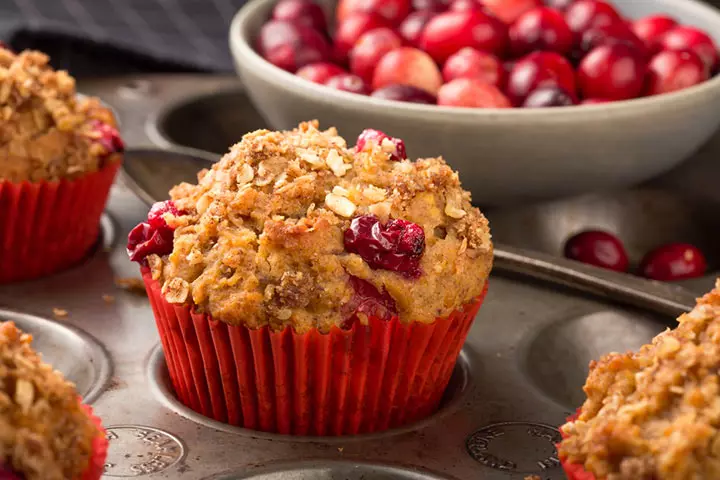
You will need:
- ½ cup rolled oats
- ½ cup plain yogurt
- ½ cup olive oil
- ¼ cup brown sugar
- ¾ cup cranberries (chopped)
- 1 egg
- ½ cup wheat flour
- 1tsp baking powder
- ½ tsp baking soda
- 1tsp orange rind (grated)
How to make:
1. Preheat the oven to 400°F (204°C). Line the muffin tin with paper liners and set it aside.
2. Soak rolled oats in yogurt just enough to make it moist.
3. Sift flour, salt, baking powder, and baking soda into a bowl. Set the bowl aside.
4. In a separate bowl, mix oil and egg. Beat until the mixture gets frothy.
5. Gently fold this mixture into the dry ingredients.
6. Add cranberries and orange zest. Mix well until everything is well combined.
7. Spoon the mixture into the muffin tin and bake for 20 minutes.
8. Once done, take out the muffin from the oven and set the tin aside to cool.
9. Serve one muffin with applesauce to your toddler and store the remaining for later consumption.
11. Vegetable savory muffins

You will need:
- 1 zucchini (medium, grated)
- 1 carrot (medium, grated)
- 1 ⅓ cup cheddar cheese (grated)
- ½ cup milk
- ¼ cup plain Greek yogurt
- ¼ cup olive oil
- 2 eggs
- 3tbsp parsley (chopped)
- 2 cups plain wholemeal flour
- 1tsp baking powder
How to make:
- Preheat the oven to 350°F. Line the muffin tray with liners.
- Take grated zucchini and carrot in a clean dish towel and squeeze the juice out.
- In a large mixing bowl, mix squeezed zucchini and carrots. Add sweetcorn, egg, cheese, milk, yogurt, olive oil, and parsley and mix until combined.
- Mix flour and baking powder, then slowly add to the wet ingredients and combine by folding in gently.
- Divide the mixture equally between the 12 muffin-tray sections and bake for 20-25 mins.
- Check if they are cooked, and let them cool before serving.
Precautions To Take While Feeding Muffins To Babies
The following precautionary steps could ensure that your baby or toddler can consume muffins safely.
1. Bake muffins at home: Most commercially prepared muffins contain a lot of unwanted additives and are also high in sugar and sodium. These ingredients aren’t healthy for the baby’s health. Therefore, prefer baking muffins at home for your baby.
 Did you know?
Did you know?2. Try muffins with minimum ingredients first: Introduce simple muffins with minimum ingredients to your baby. It gives the baby ample time to adjust to the muffin’s texture and digestibility. Also, if the baby has any reaction to it, such as an upset stomach, you will easily know the cause.
3. Ensure proper storage for prolonged use: Store the muffins in an airtight container or zip-lock bag only. You can freeze muffins for up to one to three months. However, try making them fresh as much as possible, especially for young babies.
4. Defreeze and thaw muffins properly: If you are serving frozen muffins for your baby, thaw them thoroughly. If thawing isn’t done properly, the muffin might contain hardened flour or moisture chunks that can be a potential choking hazard for babies.
5. Stay alert on allergy: Staying alert on allergies is crucial, especially considering that around 4.4% of children aged between 0 and 5 years in the US are diagnosed with a food allergy, as reported by the CDC’s National Center for Health Statistics (NCHS). Recognizing the common signs of a possible allergic reaction enables timely medical intervention. During an episode of food allergy, a baby or toddler may exhibit the following symptoms within minutes to a few hours after eating an allergenic food (4).
- Swelling of the lip, mouth, or tongue
- Skin rashes (hives)
- Itching
- Wheezing
- Abdominal cramps
- Vomiting/diarrhea
- Tightening of the throat and trouble breathing (anaphylaxis)
8. Never leave baby unsupervised: Muffins have a soft texture, so they aren’t a common choking hazard. Nevertheless, you must always feed or let your baby self-feed a muffin while seated upright. Never leave your baby unattended during mealtimes, especially when you are following baby-led weaning.
Hlucny opines, “Muffins are a low-choking risk food for babies at six months when they are ready to start solids. If your baby has the palmar grasp (six to eight months), serve muffins by cutting them in half and spreading unsalted butter on them. However, if they have the pincer grasp (over nine months), cut the muffin into chickpea-sized pieces.”
9. Select age-appropriate muffin recipes: Check the ingredients in a muffin recipe to select age-appropriate recipes for babies and toddlers. If your baby is allergic to a specific food, replace it and know about other foods that can cause cross-reactivity. For young babies, serve muffins in the form of easy-to-hold, thick strips or fingers for an ideal weaning food. Older babies can consume bite-sized pieces. Also, ensure the recipes for young babies don’t contain whole nuts and seeds.
Frequently Asked Questions
1. Can babies have English muffins?
English muffins are part of the whole grain food group recommended for young children. Hence, babies older than one year may have English muffins as long as they are consumed in big enough pieces to avoid choking hazards (5).
2. Can babies eat chocolate muffins?
Chocolate contains caffeine which is not recommended for babies younger than one year since it may cause increased heart rate, insomnia, and restlessness (6) (7). Moreover, babies younger than one year may be at an increased risk of allergic reaction due to chocolate (9). So, if you want to feed them chocolate muffins, it is better to wait until after one year.
3. Can babies have muffins that contain baking powder?
“Yes, baking powder is safe for babies when used in baked goods. Even though baking powder and soda are high in sodium, the amount in a single baked good is small and not harmful to your baby,” opines Hlucny.
4. How can I modify muffin recipes for dietary restrictions?
You can modify muffin recipes by using gluten-free flour, dairy alternatives, and sugar substitutes to cater to specific dietary needs. Always ensure the ingredients are safe for your baby’s age and health.
Muffins for babies make for a scrumptious treat for your little ones. Take a go-ahead from your baby’s doctor before including muffins in their solid diet. You may try various interesting and healthy muffins recipes such as blueberry and banana muffins or muffins with apple and carrot. You may further customize the recipe as per your baby’s age and taste preferences while also making the preparation more nutritious. Nevertheless, do follow certain precautions while baking and storing muffins before you introduce these yummy delicacies to your babies.
Infographic: More Muffin Recipes To Cater To Your Baby’s Taste
Once you have introduced finger foods to your baby, muffins are a great way to expose your little one to a wide range of flavors. They are also a great way to sneak in veggies which may not be the first choice of your baby. Check out the infographic below for more amazing muffin recipes as your baby’s experiments with food progress. Illustration: Momjunction Design Team
Illustration: Healthy And Delicious Muffin Recipes For Babies
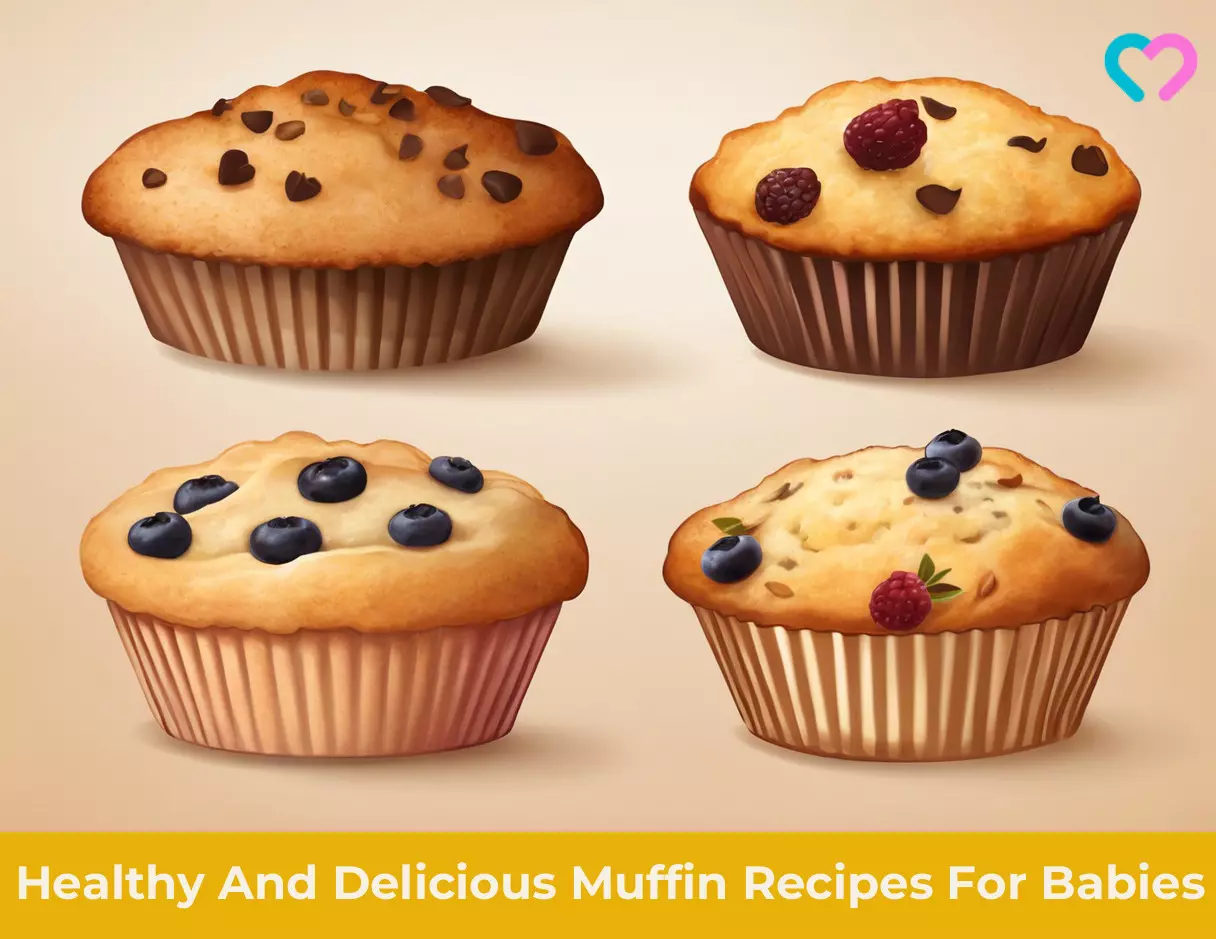
Image: Stable Diffusion/MomJunction Design Team
Enhance your toddler’s snacking experience with delectable and wholesome apple yogurt muffins. Learn the effortless recipe to create these nutritious baked goodies, tailored specifically for your little one’s delight.
Personal Experience: Source
MomJunction articles include first-hand experiences to provide you with better insights through real-life narratives. Here are the sources of personal accounts referenced in this article.
i. Banana and zucchini muffins recipe.https://bsugarmama.com/banana-and-zucchini-muffins-recipe/
References:
- Listing of Creditable Bread and Crackers for 8-11 Month Old Infants.
https://dpi.wi.gov/sites/default/files/imce/community-nutrition/pdf/gm_12_bread_crackers.pdf - AAP Clinical Report Highlights Early Introduction of Peanut-based Foods to Prevent Allergies AAP
https://www.healthychildren.org/English/news/Pages/Early-Introduction-of-Peanut-based-Foods-to-Prevent-Allergies.aspx - Cow’s milk and children MedlinePlus
https://medlineplus.gov/ency/article/001973.htm - Symptoms Food allergy NHS
https://www.nhs.uk/conditions/food-allergy/ - Right from the start: ABCs of good nutrition for young children.
https://www.childrenshospital.org/sites/default/files/media_migration/ab86df2f-d877-4128-9232-ba61f592aca7.pdf - Feeding patterns and diet – children 6 months to 2 years.
https://medlineplus.gov/ency/patientinstructions/000713.htm - Forestell C.A.; (2017); Flavor Perception and Preference Development in Human Infants.
https://www.karger.com/Article/Fulltext/478759 - Foods and Drinks to Avoid or Limit.
https://www.cdc.gov/infant-toddler-nutrition/foods-and-drinks/foods-and-drinks-to-avoid-or-limit.html? - Introducing Solid Foods to Infants.
https://hgic.clemson.edu/factsheet/introducing-solid-foods-to-infants/
Community Experiences
Join the conversation and become a part of our nurturing community! Share your stories, experiences, and insights to connect with fellow parents.
Read full bio of Dr. Elizabeth Roberts
- Katie Hlucny is a registered dietitian with over 2.6 years of experience in the field. She holds an MS in Human Nutrition and Food Science from the University of Wyoming and a BS in Dietetics from the University of North Dakota. In addition to her professional experience, Katie is a mom with a baby starting solids using a baby-led weaning approach.
 Katie Hlucny is a registered dietitian with over 2.6 years of experience in the field. She holds an MS in Human Nutrition and Food Science from the University of Wyoming and a BS in Dietetics from the University of North Dakota. In addition to her professional experience, Katie is a mom with a baby starting solids using a baby-led weaning approach.
Katie Hlucny is a registered dietitian with over 2.6 years of experience in the field. She holds an MS in Human Nutrition and Food Science from the University of Wyoming and a BS in Dietetics from the University of North Dakota. In addition to her professional experience, Katie is a mom with a baby starting solids using a baby-led weaning approach.
Read full bio of Swati Patwal
Read full bio of Rohit Garoo
Read full bio of Ghazia Shah












